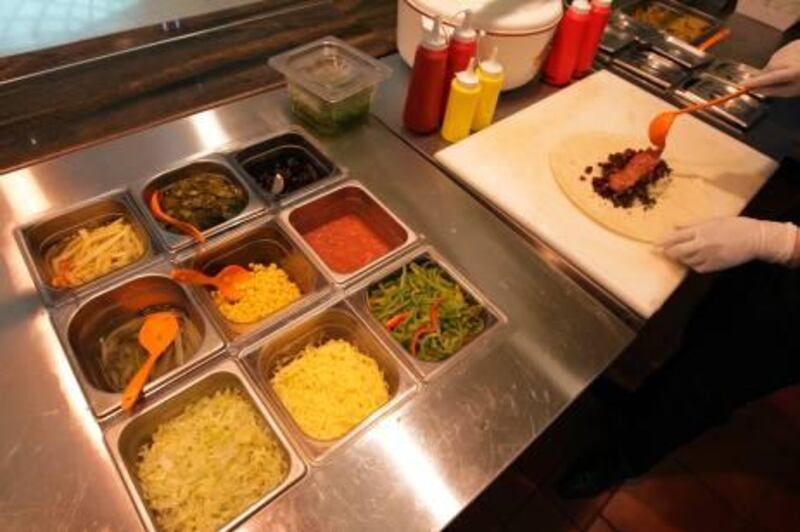Two weeks ago, 30 seconds into the 30-hour journey home to Abu Dhabi from the US and already famished, I deviated from my usual policy of not eating on the run. I ordered a loaded burrito from a drive-through tacqueria that I love, and minutes later, as I eased on to the interstate highway, the entirety of my snack's contents landed in my lap. Frantically scrubbing my black slacks clean of secret sauce in a filling-station bathroom was a sobering reminder of why I don't eat on the run: I've never been attentive enough to do it properly. Just because I can walk and chew gum at the same time doesn't guarantee I'll be walking in the right direction.
Before the drive-through window and before the age of Ritalin, there was the automat. Although it has gone the way of the personal cassette player, the automat was the industrious and unfussy granddaddies of the fast-food industry, with vending machines as servers: in goes a coin and out pops a slice of cherry pie.
Nowadays, sensible iPod Classics, and the bite-sized, candy-coloured iPod Nano can be purchased from vending machines; the ultimate in hassle-free impulse buying and instant gratification. Like the automat, whose lingering idealisation is based on little more than nostalgia, it's the CliffsNotes version of the consumer experience: all meat and zero nuance. The elimination of human exchanges from these transactions enables a degree of standardisation, and it also saves time and energy. But less isn't always more. When was the last time you had a sublime experience that didn't involve another person? A meal from a vending machine is unlikely to be any more restorative than a power nap through an alarm clock's snooze cycle.
Music, fashion, media, film: there's no food pyramid equivalent to guide our cultural diet. However, there's almost nothing it doesn't encompass. In her 2007 Wired magazine article, "Minifesto for a New Age", Nancy Miller wrote: "We now devour our pop culture the same way we enjoy candy and chips - in conveniently packaged, bite-size nuggets made to be munched easily with increased frequency and maximum speed. This is snack culture - and boy, is it tasty (not to mention addictive)."
In the end, isn't one of the best things about a snack, however you like it - crackers, yoghurt, a walk in the park or a peanut butter sandwich - its brevity? Considering the law of diminishing returns, isn't it great to eat now and then without the commitment and potential tedium of a meal? The snack is like technology, it's like gossip: so ephemeral that before you have a chance to tire of it, it becomes obsolete.
Our culture of snacking is the revised blueprint of the automat. Condense, compact and dishevelled, like my burrito - and we all know how that story ended. Last year, while actively ignoring the high-definition optical disc format war (I really, really don't care), I gave away three boxes of cumbersome CDs that I will never use again. After abandoning them at the drop-off location, I had a flashback of euphorically acquiring my very first CD (Tori Amos, Under the Pink), and examining my reflection in its sleek, prismatic underbelly. Now, I pray for days when I don't need to perform a software upgrade or update one of my many maddening devices, all of which were accumulated to make my life easier, but have only complicated it. Furthermore, I long for the days when a tweet was just a sound that a bird makes.
Caught on the dizzying see-saw between appetiser and main course sizes, I think I've forgotten how to identify and verbalise "enough" in many aspects of my life. "Enough" means something different to everyone. My Deadly Appetite, a programme broadcast on November 3 on the Discovery Channel, is the story of William Weaver, a 14-year-old American with Prader Willi syndrome, a rare genetic disorder that causes him to feel starved all the time and puts him in danger of eating himself to death.
Amazed, I began watching two-minute videos on YouTube - the snack master if ever there was one - and learnt about Lisa Sellers, a 39-year-old food addict who, at close to 300kg, lives on "snack" foods. Really, really bad snack foods.
Not all snack food is junk food, of course, but even in France, that butter-golden beacon of disparity between girth and diet, snacking has been identified as the culprit in the current obesity battle. Real mealtimes, portion sizes and food quality are the supposed backbone of the French Paradox, a widely circulated but probably moot observation that the French suffer a low rate of coronary disease for the amount of saturated fats they consume (there increasingly appears to be insufficient evidence to establish a causal link between the two).
According to government figures, 5.9 million of France's 63.4 million people are obese and 20 million are overweight. In response, the French ministry of health has launched a campaign to change the way people - especially children - select snack foods.
In the US, I have been hearing for years about how grazing on five or six small meals a day is the ideal way to eat, but now there seems to be a rising trend in diets consisting of one primary meal per day, either for weight loss or for general well-being.
The logic behind eating several small meals is simple: distribute your calorie intake throughout the day, thus stimulating the metabolism and maintaining it, thereby burning off more calories by the end of the day. As it turns out, it is hard to prove that five or more small meals instead of three moderately sized meals will help quicken metabolic rate. I don't advocate either extreme and fall squarely into the three-meals-a-day camp myself.
In the same issue of Wired as Miller's article, Steven Johnson's piece, "Snacklash: In praise of the full meal", made me think. "Snack culture is an illusion," he wrote. "We have more of everything now, both shorter and longer: one-minute movies and 12-hour epics… The truth is, we have more snacks now only because the menu itself has gotten longer."
I know he's right.






